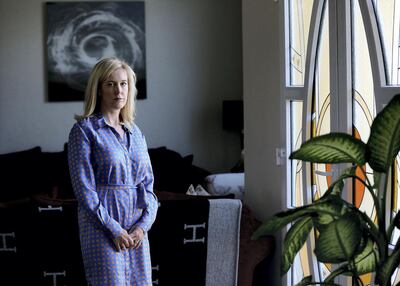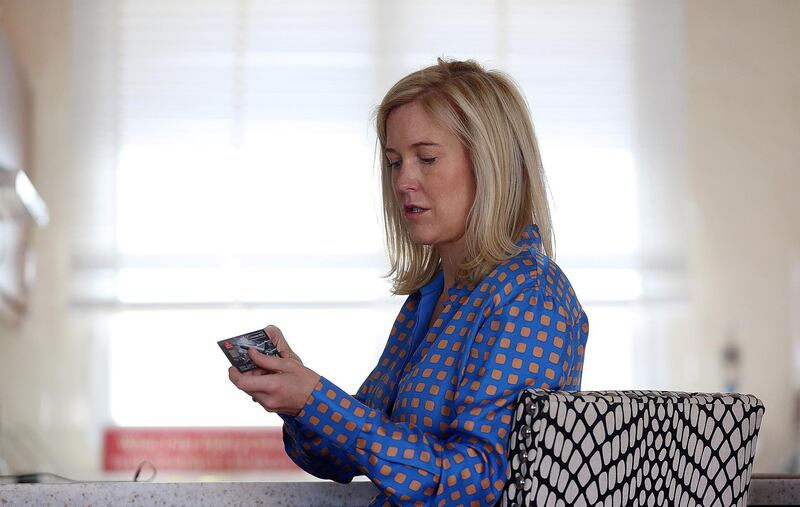When Ema Linaker signed up for a new credit card in 2014, she was encouraged by the bank’s salesman to take out credit shield – a type of insurance that protects cardholders against an unforeseen event.
As someone who spends up to Dh50,000 on her card each month, she felt having the insurance would protect her outstanding balance in the event anything went wrong.
“I signed for it because I travel a lot and often lose stuff. The salesman said it would give me 100 per cent peace of mind because it was meant to protect against fraud so that if anything happens to you, you are covered,” says Ms Linaker, 42, a digital media executive, from the UK.
Over the next four years the marketing executive, who works between Dubai and Hong Kong, paid out between Dh80 and Dh400 a month for the insurance called Protect Plus on her Emirates NBD Skywards Infinite credit card.
But when her bag was stolen during a business trip in Hong Kong in March this year - with the thief making Dh11,000 in transactions on her Emirates NBD card within hours - she quickly discovered the insurance had been mis-sold to her.
Far from being designed to protect her against fraud, its main purpose was to cover the outstanding credit card balance in the event of job loss, critical illness or death. When the bank initially told her they would not refund the Dh11,000 fraudulent transactions - because she had struggled to contact them for several hours to cancel the card after failing the security check - she was devastated.
While Ms Linaker has now been refunded the Dh11,000 after filing a complaint to the bank, she urges others not to take out the insurance.
“I was mis-sold the insurance,” she says. “I would tell people not to bother with credit card insurance. I've spent thousands on insurance in good faith."
A spokesperson for Emirates NBD says that its credit card customers have the option of applying for the additional Protect Plus insurance cover when signing up for the card.
"The insurance plan is designed to protect cardholders and their families from having to repay the outstanding balance on the card in case of the unfortunate demise of the cardholders or their becoming critically ill or permanently and totally disabled," the spokesperson says. "Protect Plus also provides additional cover for accidental death, involuntary job loss and hospitalisation. The plan, however, does not cover fraud. "
The bank says that because the card was reported stolen by the customer after the disputed transactions had taken place, Ms Linaker was therefore "fully liable for the transactions". "However, further to our interventions with the concerned scheme insurance claim team, the case was evaluated further and the customer exceptionally provided with a full refund,” the spokesperson says.
______
Read more:
How an Abu Dhabi resident took three UAE banks to court and cleared Dh700,000 debt
How to keep your UAE credit cards safe from fraud
A nine-step guide to help you renegotiate bank debts in the UAE
_______
Credit shield, which may be labelled differently by each bank, is an insurance generally sold as an extra with your card for a monthly fee.
Ambareen Musa, chief executive of Souqalmal.com, says the standard credit shield does not offer protection against fraudulent activities.
“It specifically provides insurance coverage to repay your outstanding credit card balance in case of death, permanent/temporary total disability, critical illness, and involuntary loss of employment,” she says.
“While credit shield offers a lump-sum death and disability benefit of anywhere between Dh50,000 to Dh300,000 to repay your unpaid credit card debt, it can also help pay off 10 to 15 per cent of your monthly outstanding credit card balance for up to 12 months of involuntary unemployment.”
This was the protection Bradley McWilliams, from South Africa, needed when he lost his job in February this year.
Mr McWilliams, a paramedic, was told by his employer his contract was not going to be renewed. Facing a period of unemployment, he contacted the two banks he had credit cards with, to make a claim on his credit shield.
“I’ve always taken out credit card insurance because you never know what might happen,” says Mr McWilliams, who has lived in the UAE for 14 years.
When he lost his job, he had two outstanding debts: a credit card with a balance of Dh20,000 with Mashreq and a second card with an outstanding balance of Dh10,000 with RAKBank.
The moment his contract ended, Mr McWilliams contacted both banks and submitted all the required paper work for his claims.
Mashreq honoured the claim, agreeing to pay Dh2,400 a month on the outstanding balance until he secured a new job.
RAKBank, however, refused, arguing that rather than being terminated, his contract had simply not been renewed, which therefore did not qualify as termination.
‘To qualify for the cover I had to be sacked,” says Mr McWilliams. “But it is a job loss – I have loss of earnings because my contract has not been renewed.”
Mr McWilliams says he feels disappointed because he has paid RAKBank's credit shield cover for 10 years at a rate of about Dh45 per month.
“You pay all this money every month and then they refuse to pay out when you approach them,” he adds.
A RAKBank spokesperson said its credit shield terms and conditions are sent to all customers along with the credit card and are also available on its website.
"On that basis, a thorough investigation was conducted in Mr William’s case and it revealed that clause #5.3, under the Credit Shield Terms & Conditions, stipulates that Involuntary Loss of Employment benefit shall not be payable to the cardholder on account of such claim arising out of and/or attributable to and/or in connection with: unemployment due to non-performance or under performance; unemployment due to non-renewal of employment contract," the spokesperson said.
"In view of the above, the bank has reiterated its inability to fulfil Mr William’s request for a credit shield claim as it does not fall under the eligibility criteria, clearly stipulated under exclusions section no. 5 in the Credit Shield Terms & Conditions."
______
Read more:
Which UAE credit card should you choose?
It is possible to restructure debt directly with UAE banks, a Sharjah resident reveals how
UAE credit card costs to watch out for
______
While Ms Linaker and Mr McWilliams feel let down by their banks, other readers have complained to The National about banks automatically charging the insurance without asking if they actually want the protection.
A Lebanese engineer, who did not want to be named, said he noticed the charge on his monthly statement a few months after taking out a new credit card. His bank removed the charge when he complained and refunded the amounts he had paid for the previous four months.
Ms Musa says the insurance should not be automatically charged as customers are typically asked if they want the cover when they take out a card.
"There have been cases where cardholders notice a monthly charge towards credit shield protection in their credit card bill statements, without having opted for this coverage," she says.
“It's important to watch out for the loopholes, for instance you may have let a bank rep fill out your credit card application without going over it thoroughly or you may have shown interest in signing up for credit shield over a marketing call from the bank. Either way, the bank cannot charge you for it without your consent. You can lodge a complaint with the bank if you see an unsolicited charge in your card statement and request a full refund.”

Ms Linaker has now cancelled her Protect Plus coverage with Emirates NBD, and says she feels traumatised by being mis-sold the insurance plan.
“I just thought those charges was there to protect me rather than taking more money from me,” she says.
The Emirates NBD spokesperson says the monthly premium for its Protect Plus plan is 0.99 per cent of the card’s outstanding balance.
The bank's spokesperson adds: "Details of the plan are set out in the card application form as well as communicated in a follow up email to the customer on signing up for the plan."
_______
Read more:
Five money mistakes to avoid in your 20s
The Debt Panel: Graduate struggling with university debts after job loss from multinational firm
The expensive bills you can now pay monthly in the UAE
________
How credit shield works:
Ambareen Musa, chief executive of Souqalmal.com, explains how credit shield works in the UAE:
What is credit shield?
A type of insurance, generally sold as an extra with your card for a monthly fee, it specifically provides insurance coverage to repay your outstanding credit card balance in case of death, permanent/temporary total disability, critical illness, and involuntary loss of employment (ILOE).
How much does it cost?
Typically 0.5 per cent to 0.99 per cent of the monthly outstanding balance - each bank differs as the cover differs too, so it is important to check that a) it is not being automatically put on your statement and charged and b) check the benefits and whether it is really worth it.
How much are banks willing to pay out?
Credit shield coverage is limited up to a pre-specified limit and this varies across banks. Banks offer different coverage for different eventualities. For example, the death and permanent disability coverage is set at a maximum of Dh300,000 at Emirates NBD, Dh200,000 at HSBC (for its premium cards), Dh100,000 at CBD, and Dh50,000 at Mashreq. Maximum monthly ILOE coverage is Dh4,000 for 12 months at Emirates NBD and Mashreq and Dh3,000 for six months at CBD.
Does everyone need credit shield?
Credit shield is not a must-have for everyone. For instance, you may already have the same benefits under a different insurance plan or you may be self-employed, which makes the ILOE benefits redundant. And not all credit shields are created equal. For example, some credit shield products offer additional benefits like temporary disability coverage and cash benefits while many do not.
What else should customers be wary of?
Unlike other insurance plans where the customer has full knowledge of the claims procedure and access to relevant policy documents, credit shield could end up being left unused, especially in cases where the cardholder has no knowledge of how to benefit from it. Credit shield protection is subject to terms and conditions and comes with a long list of exclusions. Therefore, applicants must read the small print before applying for it.
If you do want the cover, how do you opt in?
There are usually three ways a cardholder can opt for credit shield protection. First, by checking the relevant box in their credit card application form, second, by applying for the coverage through the bank if the card has already been issued, and third, by providing consent in response to a marketing email or telephonic conversation with a bank representative.







